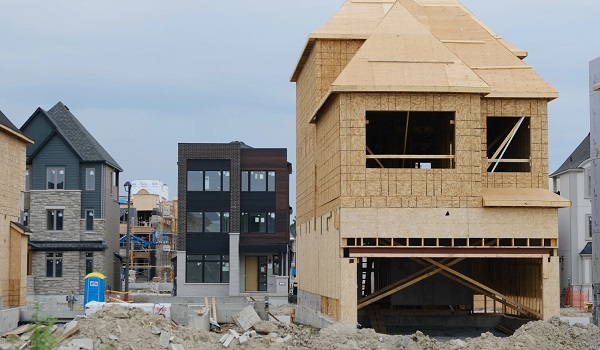BILD calls on GTA municipalities to speed up approval, reduce fees for new housing developments
The Building Industry and Land Development Association (BILD) on Wednesday reiterated calls for GTA municipalities to speed up approval times and reduce fees for new developments — moves it says would help affordability — as its 2024 Municipal Benchmarking Study found approval times averaged 20 months.
“The goal is to shorten the time frames,” said David Wilkes, the president and CEO of BILD.
“We have seen municipalities begin to focus on that, and we believe there needs to be more focus.”
Applications decreased significantly over the last two years likely due to policy changes and economic conditions, the report added, but average approval times only improved slightly compared to 2022.
Holding land vacant can add $2,673 to $5,576 per month per unit to the cost of producing housing, the report said, noting the average time frame for an approval would bring the total added costs to $43,000 to $90,000.
The report also found the number of new homes built lagged significantly behind population growth, causing the greatest gap between the housing stock and the population in more than 50 years.
“This is the first post-pandemic study,” Wilkes said. “Especially given that there is declining volume, we’re surprised that we didn’t see increased improvement in timelines.”
The City of Toronto, for its part, saw approval timelines improve from 32 months on average in 2022 to 25 months in 2024.
In an emailed statement to the Star, Toronto’s project director of business transformation and development review, Michelle Drylie, highlighted steps the city has taken to fast-track approvals and said the city is committed to continued improvement.
In 2023, Toronto centralized all roles for development review under Development and Growth Services, and within that, created a division to expedite the review of development applications. Its focus is on getting more affordable homes built faster, the statement said.
Plus, the city has quarterly reports showing a roughly 80 per cent drop in average decision timelines for development applications since July 1, 2023, Drylie said, an improvement that the report does not clearly show.
Experts divided on BILD’s calls to action
While Ontario’s Planning Act gives municipalities a target of three to four months to approve developments, Frank Clayton, senior research fellow at Toronto Metropolitan University’s Centre for Urban Research and Land Development, said those timelines are “unrealistic.”
Clayton highlighted that the GTA faces more growth pressures than other parts of Ontario and there’s no “metropolitan level of government” centralizing development applications.
However, he agreed there should be continued efforts to shorten approval times (noting 10 or 15 months would be more realistic) and said development charges must be reformed.
“It’s a big, big problem, but it won’t do much if one municipality cuts development charges by 10 per cent or five per cent and somebody else doesn’t do it at all,” he said, adding that development charges could be spread across taxpayers, not just the housing costs of new developments.
The city said there were many challenges to the housing crisis that the study did not capture.
“While timelines and other process improvements are important, many socio-economic factors, including housing supply, macroeconomic conditions and labour supply, influence housing affordability and should be acknowledged to understand the challenges and find solutions to the housing crisis,” Drylie’s statement read.
University of Toronto’s chair in housing David Hulchanski said the situation is not as bad as some of BILD’s rhetoric suggests, noting the report found approval times across municipalities decreased by 2.4 months since 2022
“What BILD does not mention is the large number of already approved projects (approved rezonings, etc.) that are not being developed,” Hulchanski wrote in an email. “We should be told how many of these have been approved annually and what per cent have not been built.
“There is no municipal delay crisis as long as there is a backlog of already approved projects and as long as municipalities actively seek to improve their timelines — which they are doing,” he said.
Clayton noted that investors pulling out of development projects, low demand and labour shortages can cause backlogs to development.
He said developers also plan projects in anticipation of high demand, “a prudent business way” as they spend massive sums of money upfront to develop projects.
The only way to speed up the building process if developers are waiting for demand to increase is for governments to subsidize them, he said.
Hulchanski said developers have been seeking subsidies as long as he has studied the issues, an expense that ultimately falls on local taxpayers.
“How much of the subsidy will go to the house buyer/renter and how much to the developer? We don’t know because the answer depends on market conditions,” he wrote.
“In a hot market, the developer/builder keeps all of the subsidy — if municipal fees were reduced or eliminated.”
This article was first reported by The Star













